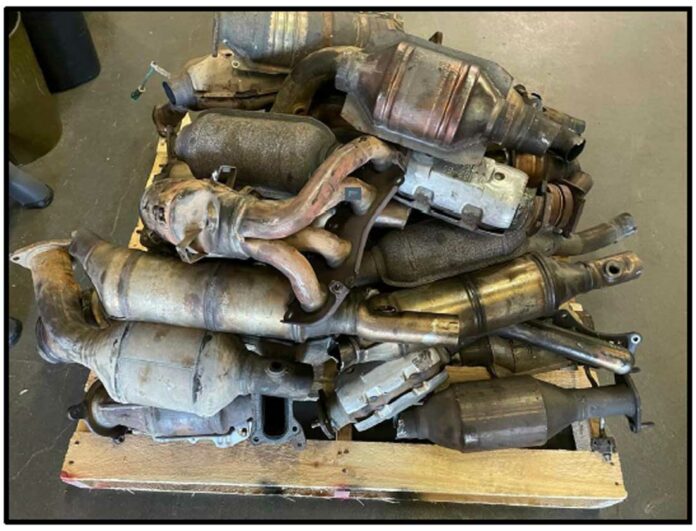
Skyrocketing numbers of catalytic converter thefts within Gilroy have police on high alert and advising residents to take precautions to prevent thieves from grabbing the highly valuable vehicle parts.
According to Gilroy Police Capt. Jason Smith, police received 172 reports of stolen catalytic converters in 2021, compared to four in 2019. The average amount of reported thefts per month over the last six months is 14.5, he added.
And those are just the ones that were reported, Smith advised.
Catalytic converters reduce the amount of pollution coming out of a vehicle. There are several valuable metals used within the devices, such as rhodium, platinum and palladium, which are targeted by thieves.
According to investigators, it can take less than two minutes for thieves armed with mini electric saws to chop converters from the undercarriages of certain cars. The thieves then sell the stolen goods to a “fence” or middleman for between $50 to $800 apiece.
Toyota Priuses are popular targets for thieves, Smith said, as well as trucks and vans due to their high ground clearance. Replacing the converters can cost thousands of dollars.
Catalytic converters are not serialized, making it difficult if not impossible to track down if they have been stolen, according to Smith. He pointed to a recent example in Gilroy, when officers pulled over a person for a violation, and discovered two catalytic converters in the back seat of the vehicle. The person told officers they received the parts “from a friend.”
“We had a very good suspicion that they weren’t legitimately owned,” Smith said. “But there was ultimately nothing we could do, since we couldn’t trace them back. Without any serialization, we don’t have any way to prove that.”
Most of the thieves come to Gilroy from San Jose or the surrounding areas, Smith said. In January, San Jose Police arrested 15 people suspected of stealing hundreds of catalytic converters.
Vehicle owners are advised to park in a garage or areas that are well-lit with regular passing traffic. They should also etch their license plate number onto the converter to make it easier for police to track it if it has been stolen.
Catalytic converter cages can also be welded underneath a vehicle to shield the part.
Smith said police are patrolling neighborhoods and other hotspots in the hopes of deterring or catching thieves. Gilroy Police are also looking at examples other cities are using to curb the problem, such as prohibiting recyclers from taking the converters and partnering with auto body shops to etch license plate numbers on the part.
City Councilmember Dion Bracco, who owns Bracco’s Towing and Transport, said his business receives calls nearly every day to tow vehicles that have been hit by these thieves. He added that his vehicle was also hit a number of years ago, and it cost more than $5,000 to replace the catalytic converter.
Etching the license plate number onto the converter isn’t the best solution, Bracco said, as thieves can use a piece of sandpaper to erase it. He suggested having a license plate number or other identification welded on the converter, as well as have a welder install a shield around it.













